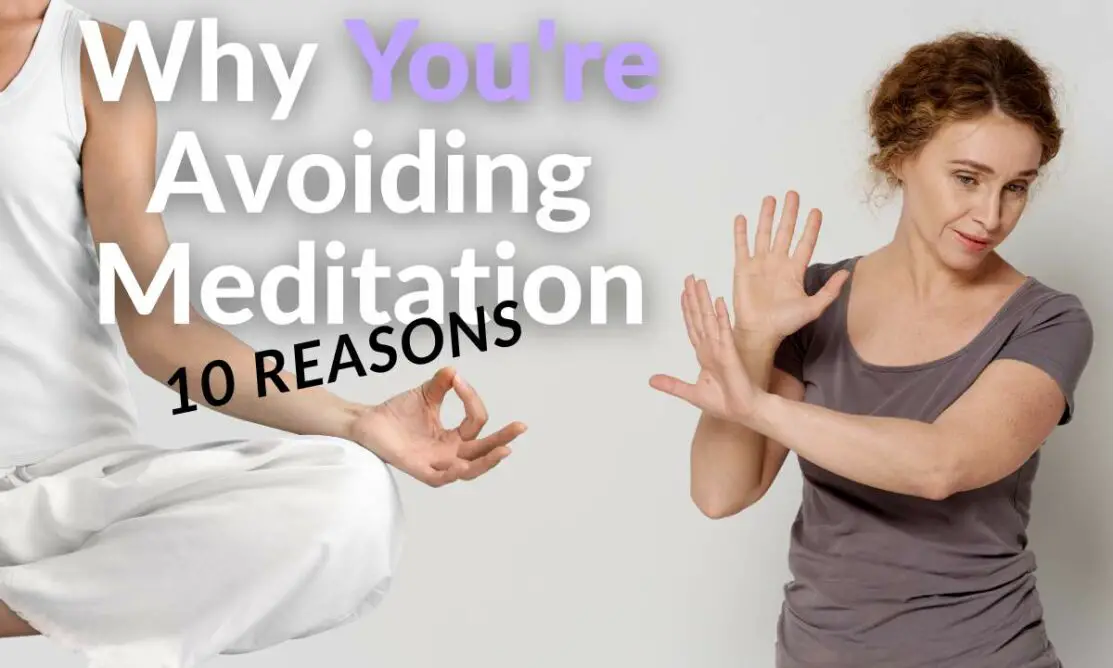Meditation is a powerful tool for self-improvement and personal growth, yet many of us avoid it.
Whether it’s because of fear, lack of time, or simply not knowing how to get started, there are many reasons why we avoid meditation.
In this article, we’ll explore 10 of the most common reasons why people avoid meditation and how to overcome them.
By understanding the reasons why we avoid meditation, we can take steps to make it a part of our daily routine and reap the many benefits it has to offer.
Fear of Being Judged:
People may be afraid to meditate because they think others will judge them for doing it.
Do you ever feel like you’re too embarrassed to meditate? Like you’re worried that people will judge you for doing something that’s seen as a bit “out there”? Well, don’t worry – you’re not alone!
It’s totally normal to feel a bit self-conscious about meditating, especially if you’re new to it. After all, it’s not something that everyone does, and it can be hard to take the plunge and give it a try. But here’s the thing: meditation is actually a really great way to relax and take care of your mental health. So don’t let fear of judgment stop you from giving it a go!
The truth is, nobody is judging you for meditating. Sure, some people might not understand it, but that doesn’t mean they’re judging you. And even if they are, who cares? You’re doing something that’s good for you, and that’s all that matters.
So don’t be afraid to give meditation a try. You don’t have to be a master meditator – just take a few minutes each day to sit in silence and focus on your breath. You might be surprised at how much better you feel afterward!

Fear of Failure:
People may be afraid to meditate because they think they won’t be able to do it correctly or that they won’t be able to stick with it.
If you’ve ever considered trying meditation but felt too intimidated to give it a go, you’re not alone. Fear of failure is a common reason why people avoid trying new things, and meditation is no exception. It’s understandable to feel a bit apprehensive about trying something new, especially if you’re not sure how to do it correctly or if you’re worried you won’t be able to stick with it.
But here’s the thing: meditation isn’t about being perfect or achieving some kind of enlightenment. It’s simply about taking a few moments to be still and focus on your breath. It’s about being kind to yourself and allowing yourself to just be. So don’t let fear of failure stop you from giving meditation a try. You don’t have to be an expert to reap the benefits of this practice. All you need is a few minutes of your time and an open mind.
Lack of Motivation:
People may not feel motivated to meditate because they don’t understand the benefits or don’t think it will make a difference.
If you’ve been struggling to find the motivation to meditate, you’re not alone. It can be hard to make time for something that doesn’t seem to have an immediate payoff. But the truth is, meditation can have a huge impact on your life.
From reducing stress and anxiety to improving focus and concentration, the benefits of meditation are far-reaching. It can even help you become more mindful and present in your day-to-day life.
So, how can you get motivated to meditate? Start small. Set aside just five minutes a day to sit in silence and focus on your breath. This can help you get into the habit of meditating and make it easier to stick with it.
You can also try different types of meditation. There are many different styles, from guided meditations to walking meditations. Experiment to find the one that works best for you.
Finally, don’t be too hard on yourself. Meditation isn’t about perfection. It’s about being present and aware in the moment. So, if your mind wanders, just take a deep breath and refocus.
With a little bit of effort, you can find the motivation to meditate and reap the rewards.
Lack of Time:
People often feel that they don’t have enough time to dedicate to meditation.
We all know how busy life can get. Between work, family, and social obligations, it can feel like there’s no time left for anything else. But if you’re looking to add a little more peace and balance to your life, meditation is a great way to do it. And the good news is, you don’t need to dedicate hours of your day to it. Even just a few minutes of meditation can make a big difference.
If you’re short on time, try setting aside just five minutes a day for meditation. You can do it first thing in the morning, or right before bed. Find a comfortable spot, close your eyes, and focus on your breath. Don’t worry if your mind starts to wander—just gently bring your attention back to your breath.
You can also try guided meditations, which are available online or through apps. These are great for beginners, as they provide step-by-step instructions and help keep you focused.
Meditation doesn’t have to be a huge time commitment. Even just a few minutes a day can help you feel more relaxed and balanced. So don’t let a lack of time stop you from reaping the benefits of meditation.
Fear of the Unknown:
Many people are afraid to meditate because they don’t know what to expect or what will happen.
If you’ve ever considered trying meditation but felt too intimidated to take the plunge, you’re not alone. Many people are afraid to meditate because they don’t know what to expect or what will happen. It’s natural to feel a bit apprehensive when trying something new, but don’t let fear of the unknown keep you from exploring the potential benefits of meditation.
Meditation is a practice that has been around for centuries and is used by people of all backgrounds and beliefs. It’s a simple way to relax, reduce stress, and gain clarity. It can also help you become more mindful and aware of your thoughts and feelings.
The great thing about meditation is that it’s easy to learn and can be done anywhere. All you need is a quiet space and a comfortable position. You can start with just a few minutes a day and gradually increase the amount of time you spend meditating.
If you’re still feeling a bit unsure, there are plenty of resources available to help you get started. You can find guided meditations online, attend a meditation class, or even download an app to help you learn the basics.
Don’t let fear of the unknown keep you from trying something new. Meditation is a great way to relax, reduce stress, and gain clarity. With a little practice, you’ll soon be reaping the benefits of this ancient practice.
Thinking that Meditation Is Boring
Meditation is often seen as a boring activity, but it doesn’t have to be! There are so many different ways to meditate, and you can make it as interesting as you want.
For starters, you don’t have to sit in a lotus position and chant mantras if that’s not your thing. You can meditate while walking, or even while doing something creative like painting or drawing. You can also try guided meditations, which are basically like listening to a story. There are plenty of apps and websites that offer guided meditations, so you can find one that suits your interests.
Another way to make meditation more interesting is to set yourself a challenge. For example, you could try to meditate for a certain amount of time each day, or you could try to meditate in a new place each day. You could also try to meditate with a group of friends, or even with your pet!
Meditation doesn’t have to be boring. With a bit of creativity, you can make it an enjoyable and rewarding experience. So don’t be afraid to experiment and find a meditation style that works for you.
Meditation is too hard
If you’ve ever tried to meditate, you know it can be tough. It’s not always easy to sit still and focus on your breath, especially when your mind is racing with thoughts. But don’t give up just yet! There are plenty of ways to make meditation easier and more enjoyable. Here are a few tips to get you started:
1. Start small. Don’t try to meditate for hours at a time. Start with just a few minutes and gradually increase the amount of time you spend meditating.
2. Find a comfortable spot. Make sure you’re in a place where you won’t be disturbed. This could be a quiet corner of your home or a peaceful spot in nature.
3. Focus on your breath. When your mind starts to wander, bring your attention back to your breath. This will help you stay in the present moment.
4. Don’t be too hard on yourself. Meditation isn’t about perfection. It’s about being kind to yourself and allowing yourself to be in the moment.
With a little practice, you’ll find that meditation can be a great way to relax and find inner peace. So don’t give up! You can do it!
You feel that meditation takes too long to work
Meditating can seem like a daunting task, especially if you’re just starting out. It can feel like it takes forever to see any real results, and it can be hard to stay motivated. But here’s the thing: meditation doesn’t have to take a long time to work.
In fact, you can start to feel the benefits of meditation in as little as five minutes a day. That’s right – just five minutes! It might not seem like much, but it can make a huge difference in your life.
When you meditate, you’re taking time to focus on your breath and be mindful of the present moment. This helps to reduce stress and anxiety, and can even help to improve your overall mental and physical health.
So if you’re feeling overwhelmed by the idea of meditating for long periods of time, don’t worry. Just start with five minutes a day and see how it goes. You might be surprised at how quickly you start to feel the benefits.
thinking that meditating can give uncomfortable feelings
Meditating can be a great way to relax and clear your mind, but it can also bring up some uncomfortable feelings. It’s important to remember that this is totally normal and nothing to be worried about.
When we meditate, we’re allowing ourselves to be present in the moment and to really feel what’s going on inside us. This can be a great way to become more aware of our emotions and to process them in a healthy way. But it can also bring up some uncomfortable feelings that we may not be used to dealing with.
It’s important to remember that these feelings are normal and that it’s okay to feel them. It’s also important to remember that these feelings won’t last forever. If you’re feeling overwhelmed or anxious, take a few deep breaths and focus on the present moment.
It’s also important to remember that it’s okay to take a break from meditating if you need to. If you’re feeling overwhelmed or anxious, it’s okay to take a few minutes to step away and do something else.
Meditating can be a great way to relax and clear your mind, but it’s important to remember that it can also bring up some uncomfortable feelings. It’s okay to feel these feelings and it’s okay to take a break if you need to. Just remember that these feelings won’t last forever and that you can always come back to your practice when you’re ready.
The belief that Meditation is Not for Me
If you’ve ever thought that meditation isn’t for you, you’re not alone. Many people feel like they don’t have the time, patience, or ability to meditate. But the truth is, anyone can benefit from meditation, no matter who you are or what your lifestyle is like.
Meditation is a practice that can help you become more mindful and aware of your thoughts, feelings, and emotions. It can help you reduce stress, improve your focus, and even boost your overall wellbeing. And the best part is, it doesn’t have to take up a lot of your time. Even just a few minutes of meditation each day can make a big difference.
If you’re still not convinced, here are a few tips to help you get started:
1. Start small. Don’t try to meditate for hours at a time. Start with just a few minutes each day and gradually increase the amount of time you spend meditating.
2. Find a comfortable spot. Find a place where you can sit comfortably and won’t be disturbed.
3. Focus on your breath. Take a few deep breaths and focus on the sensation of your breath entering and leaving your body.
4. Let go of expectations. Don’t expect to have a perfect meditation session every time. Just let go and enjoy the experience.
5. Be patient. Meditation takes practice, so don’t get discouraged if you don’t see results right away.
Meditation is a powerful tool that can help you become more mindful and aware of your thoughts and feelings. So don’t let the belief that it’s not for you stop you from giving it a try. You may be surprised at how much it can help you.
Conclusion
In conclusion, there are many reasons why people avoid meditation, such as fear of the unknown, lack of time, difficulty in focusing, feeling overwhelmed, feeling uncomfortable, feeling judged, feeling like a failure, feeling like it’s a waste of time, feeling like it’s too hard, and feeling like it’s not for them. However, with the right guidance and support, meditation can be a powerful tool for reducing stress, improving mental and physical health, and creating a sense of inner peace and balance.



